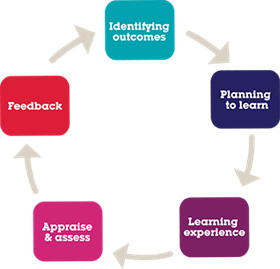Tips for teaching medical student rotations in psychiatry
The RANZCP is grateful to all the registrars who assist in the delivery of medical student psychiatry rotations to ensure students have a positive first experience of psychiatry.
You are in the frontline, providing a positive role model for the next generation of psychiatrists.

Here are a few teaching tips that we hope will make your teaching experience a little easier.
1. Before you start
Passing assessments is uppermost in students’ minds when they participate in a rotation.
Liaising with academic colleagues from the students’ university can help ensure that your teaching corresponds with the curriculum and your students will not only pass but also get the most out of the rotation.
The rotation coordinator may also have some administration requirements for issues such as attendance and participation that you may need to be aware of.
2. Set goals and make plans
The Set, Dialogue, Closure technique can help you to plan teaching events.
Set: set specific goals for the learning outcomes you want and the time you have to achieve them. Make goals relevant and appropriate for your students, and choose topics that are meaningful. Consider the environment you will be teaching in and make sure your students know what is expected of them in advance.
Dialogue: use eye contact and students’ names to help build rapport, use questions to keep them involved, and check they understand. Don’t be afraid to try various methods to keep your students engaged.
Closure: finish with a recap of the learning points you’ve covered and always finish on time.
3. Teach in one minute
The one-minute preceptor model is helpful when you have time limited clinical teaching opportunities during your daily work. These brief episodes of teaching can be extremely useful for your students, and may not have been planned.
Five simple steps can give focus to a key aspect of a case:
- Gain commitment from the student regarding an aspect of the case that gives focus.
- Probe for supporting evidence (e.g. Which factors in the patient examination or history support your diagnosis? Why would you use SSRIs here?).
- Reinforce what is done well.
- Give guidance about errors – give specific feedback without negative words (e.g. ‘a preferable approach would be...’).
- End with a general principle about the case.
4. Tackle fear of the unknown
Fears are often grounded in stigma and often students initially come to psychiatry rotations with fears about dealing with people with mental illness. Open discussion of those fears can help to demystify mental illness and give students the skills not only to address their own beliefs but also to tackle stigma when they come across it later in their careers.
Involving patients who are doing well in recovery, family members and carers, can help allay those fears and demonstrate the very real difference and improvement in peoples’ lives that psychiatric care can make.
Teaching with patients can give students the chance to observe patient contact firsthand, gain valuable exposure to role-modelling techniques and help showcase three important aspects of learning:
- clinical knowledge
- professionalism
- communication skills.
5. Use questions to educate
Questions help stimulate and involve students, allow you to check understanding and make sure your teaching is at the right level.
- Set ground rules for questions so everyone knows what is expected of them.
- Brief students and patients first to avoid embarrassing situations.
- Use the students’ names.
- Don’t be afraid to pause for thought or silences.
- Spread questions around to maximise involvement.
- Be friendly. Be encouraging. Be inclusive.
The use of questions can also help you monitor progress, encourage reasoning and help both student and teacher reflection.
6. Use the learning cycle to evaluate progress and outcomes

The cycle of learning can help to ensure good practice and outcomes for both students and teachers.
7. Give feedback for encouragement
Feedback should be specific, constructive and, where possible, encouraging and solution-focused.
It also needs to take place at the right time and in the right place and be undisturbed. Listen attentively and allow student input too.
Regular feedback can help encourage, correct mistakes and improve outcomes.
8. Keep the momentum going - Psychiatry Interest Forum
For those students stimulated by their glimpse into psychiatry, free membership of the RANZCP Psychiatry Interest Forum offers a wide range of benefits to members including:
- invitations to educational events including workshops, seminars, and career sessions
- career guidance – advice from RANZCP Fellows on career paths in psychiatry
- invitations to participate in RANZCP awards, prizes and grants around promotion, research or advocacy in mental health
- regular e-newsletter to keep members up to date with RANZCP activities.
Sources
Australian Medical Students Association – Finding a Mentor.
Health Education and Training Institute NSW (2014) Teaching to teach is a series of five short films. The series includes an introduction to the role of psychiatry trainees in teaching medical students and four short dramatised scenarios:
- a new student grappling with what help can be offered to a self harming patient
- a reserved student discussing an encounter with a crying new mother
- an honours student who looks for rare symptoms while overlooking the obvious
- a nervous student reluctant to deal with intimidating patient behaviour.
Lake FR (2004) Teaching on the run tips: doctors as teachers. Medical Journal of Australia 180: 415–6.
Mabvuure NT, Rodrigues J, Cumberworth A, Mahmud M (2013) Twelve tips for running successful junior doctor-led teaching programmes for medical students. Medical Teacher 35: 628–32.
Ramani S, Gruppen L, Kachur EK (2006) Twelve tips for developing effective mentors. Medical Teacher 28: 404–8.
Royal College of Psychiatrists (2012) Recruitment Strategy 2011–2016 [PDF; 348 KB].
Spencer J (2003) Learning and teaching in the clinical environment. British Medical Journal 326: 591–4.
Tsao C (2010) One-minute preceptor model: brief description and application in psychiatric education. Academic Psychiatry 34: 317–18.
The Royal Australian and New Zealand College of Psychiatrists has received Australian Government funding under the Specialist Training Program.
